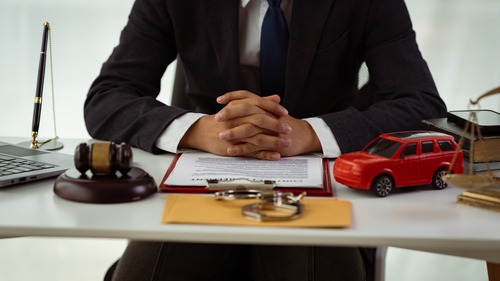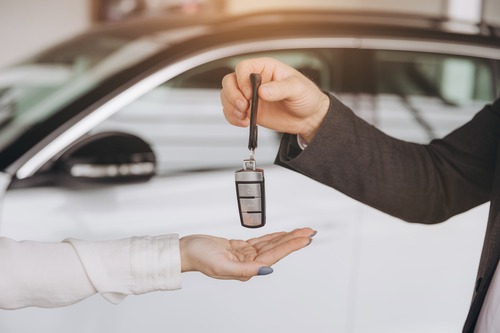When driving, split-second decisions can often mean the difference between avoiding a collision and getting involved in an accident. One common scenario that many drivers face is swerving to avoid another vehicle, a pedestrian, or an obstacle on the road. But what happens if your quick action to avoid a car accident results in a crash with another car or property? Who is responsible for such a situation? The answer to this question can be complex and is influenced by various factors, including the circumstances leading up to the swerve and local traffic laws.
In this blog, we’ll discuss the legal implications of swerving to avoid an accident, how fault is determined in these cases, and the importance of working with an experienced Atlanta car accident lawyer to ensure you receive the compensation you deserve.
Reasons for Swerving
When drivers find themselves in a situation where an accident seems imminent, they may instinctively swerve to avoid a collision. This reaction can stem from various scenarios. Understanding these reasons is vital in determining fault and liability in the aftermath of an accident.
In some cases, a driver may swerve due to a no-contact car accident, where another driver causes them to crash without direct contact, complicating the process of proving fault and liability.
Avoiding a Negligent Driver
One of the most common reasons for swerving is to avoid a negligent driver. For instance, if another vehicle suddenly changes lanes without signaling, the driver may have to swerve to prevent a collision. In such cases, the driver who swerved can argue that their actions were a reasonable response to an unexpected and dangerous situation.
Additionally, accidents involving a phantom driver, who causes a crash without direct contact, present unique challenges in proving their involvement and may require gathering evidence and calling the police.
Proving the Necessity and Reasonableness of the Swerve
To establish that swerving was necessary, the driver must demonstrate that their actions were reasonable. This can involve showing that the other driver’s actions were reckless or that there was an immediate threat to safety. Evidence such as witness statements and police reports can play a crucial role in proving this necessity.
Potential Scenarios and Outcomes
Several scenarios can lead to swerving, each with different implications for liability. For example:
- Sudden Obstruction: If a driver swerves to avoid hitting an animal or an object on the road, they may not be held at fault if necessary to prevent greater harm.
- Unpredictable Behavior: If a driver swerves to avoid another vehicle that is speeding or driving erratically, they may be able to argue that their actions were a direct response to the other driver’s negligence.
- Multiple Vehicles Involved: In cases involving multiple vehicles, the situation can become more complex. Each driver’s actions will be scrutinized to determine who was at fault and to what degree.
Determining Fault in Car Accidents
When it comes to car accidents, determining fault is crucial. It shapes how insurance claims are handled and who is responsible for damages, often involving the insurance company in processing these claims. In cases where a driver swerves to avoid an accident, the analysis becomes more complex. Here’s how fault is determined:
Analyzing the Actions of All Drivers Involved
To establish fault, the actions of all drivers must be examined. This includes looking at what each driver did leading up to the accident. If one driver was speeding or driving recklessly, that behavior could be a significant factor. On the other hand, if you swerved to avoid an accident caused by another driver, your decision may be seen as a reasonable response to an immediate danger.
Evaluating Negligence and Compliance with Traffic Laws
Next, negligence plays a key role in determining fault. Negligence refers to a driver’s failure to exercise reasonable care. If you swerved to avoid a collision but were otherwise following traffic laws, you may not be considered at fault. Conversely, if you were speeding or distracted, it could complicate your case.
The Role of Police Reports and Witness Statements
Police reports and witness statements are vital in establishing fault. Officers often document the scene and provide an objective account of the events. Witnesses can corroborate your version of the story, especially if they saw the other driver behaving recklessly. Collecting this evidence is crucial for building a strong case. It can help clarify the circumstances surrounding the accident and support your compensation claim.
Immediate Actions After the Accident
If you find yourself in a situation where you swerved to avoid an accident, taking the right steps afterward is crucial. Your actions can significantly impact any potential claims or legal proceedings that may follow. Filing an accident claim is essential to seek compensation for damages, especially when dealing with complex scenarios like phantom drivers or uninsured motorists.
Ensuring Safety and Calling Emergency Services
First and foremost, prioritize safety. If you are involved in a collision, move your vehicle to a safe location if possible. Turn on your hazard lights to alert other drivers. If anyone is injured, call emergency services immediately. Prompt medical attention can be vital in preventing further complications.
Documenting the Accident Scene and Gathering Witness Information
Next, document the accident scene thoroughly. Take photographs from various angles, capturing vehicle positions, damage, and any relevant road signs or signals. If there are witnesses, gather their contact information. Their statements can be invaluable when establishing the circumstances of the accident.
Reporting the Incident to the Police and Securing a Police Report
Finally, report the incident to the police. A police report provides an official account of the accident, which can be critical for insurance claims and legal purposes. Make sure to request a copy of this report for your records. This document will detail the facts as assessed by law enforcement, including any citations issued and their observations regarding the fault.
Role of Insurance Companies
When dealing with car accidents, understanding your auto insurance policy is crucial. Insurance companies play a significant role in determining fault and compensating for damages. Knowing how to navigate this process can help you secure the compensation you deserve. A car accident lawyer can provide essential legal assistance, helping you gather evidence, negotiate with insurance companies, and ensure you receive the compensation you deserve for your injuries and losses.
Navigating Your Auto Insurance Policy
Your auto insurance policy outlines the coverage you have in case of an accident. Familiarize yourself with key terms such as liability coverage, collision coverage, and uninsured motorist coverage. Each of these components is essential in addressing damages and medical expenses after an accident. If you swerved to avoid a collision, your policy may cover your damages, depending on the circumstances and your coverage type.
Dealing with Insurance Claim Denials or Contests
Insurance companies may deny or contest claims based on their assessment of fault. If you swerved to avoid an accident, they might argue that you contributed to the incident. Documenting the reasons for your actions is vital. Keep records of all communications with your insurer, as this can help you build a case if you need to challenge a denial.
Strategies for Effective Negotiation with Insurers
Negotiating with insurance companies can be challenging. They often aim to minimize payouts. Here are some strategies to improve your chances of a favorable outcome:
- Present clear evidence: Use photos, witness statements, and police reports to support your claim.
- Know your rights: Understand the laws in your state regarding fault and compensation. This knowledge can strengthen your position during negotiations.
- Be persistent: Don’t accept the first offer. Counter with a reasonable request based on your documented evidence and expenses.
Potential Liability and Financial Recovery
When you swerve to avoid an accident, determining liability can become complex. If you cannot prove that swerving was necessary, you may face challenges in your claim. Courts often look for evidence that the swerve was a reasonable reaction to an immediate danger. If you fail to establish this necessity, you could be found partially or fully at fault.
Consequences of Failing to Prove the Necessity of Swerving
If you cannot demonstrate that swerving was essential to avoid a collision, you may be held liable for any damages incurred. This includes vehicle damage, medical expenses, and other losses. For instance, if your actions led to a collision with another vehicle or property, you may be responsible for covering those damages. Insurance companies may also use this lack of evidence to deny your claim or offer a significantly reduced settlement.
Covering Vehicle Damage, Medical Bills, and Other Losses
In the aftermath of an accident, the financial implications can be significant. You may need to cover costs such as:
- Repairs to your vehicle
- Medical bills for injuries sustained
- Lost wages due to time off work
- Other related expenses
Seeking Fair Compensation Through Car Accident Claims
If you find yourself in a situation where you have to swerve to avoid an accident, it’s vital to consult with a skilled car accident lawyer. They can help you gather evidence, such as witness statements and police reports, to support your claim. Your attorney will work to demonstrate that your actions were justified and that you deserve fair compensation for your losses.
Consult With an Experienced Atlanta Car Accident Attorney ASAP!
If you’ve been involved in a car accident after swerving to avoid a collision, don’t navigate the legal process alone. The skilled attorneys at GMV Law Group are here to help you determine fault, gather evidence, and pursue the compensation you deserve for medical bills, property damage, and other losses.
Contact us at 404-975-4878 today for a free consultation!





